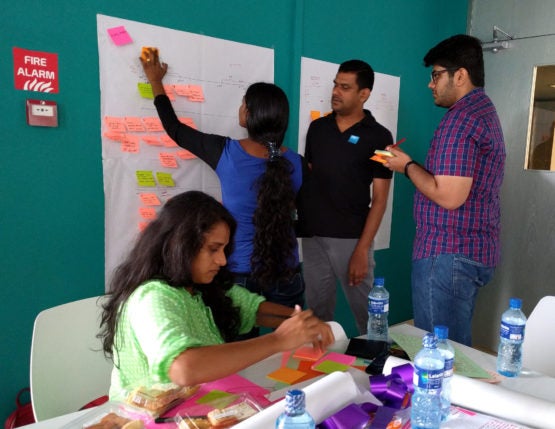Stanford Professor Jennifer Widom embarks on an international teaching odyssey
The computer scientist is spending her sabbatical year offering an experimental “massively open in-person course” across the globe.

Students in Sri Lanka participate in Jennifer Widom’s design-thinking workshop. (Image credit: Jennifer Widom)
While free online courses have provided access to Stanford faculty to learners worldwide, computer scientist Jennifer Widom is taking the idea one step further. For the next year, Widom will travel across the globe to share her knowledge with a wide swath of students at lesser-resourced institutions across the globe.
Widom is using her year-long sabbatical to experiment with what she’s jovially described as a “massively open in-person course,” or “MOIC.” The name riffs on MOOCs, or massively open online courses, a medium that made Widom something of a global engineering celebrity over the last few years thanks to her enormously popular “Databases” MOOC, which has generated 8 million video views and 600,000 assignment submissions since its 2011 debut.
“My main offering as I travel is a set of course modules on big data, from an introductory overview to hands-on analytics and programming,” Widom said. “The modules are based on a course I developed for Stanford students last year, but I’ll be taking it specifically to places where they would like to learn this material but don’t have people who can teach it at the level of detail I’m offering.”
So far she’s booked engagements at colleges in 19 nations, including Bhutan, India, Peru, Namibia and Kyrgyzstan.
While acknowledging that her instructional adventure is something of a step into the unknown, she hopes to gain insights into student interest in computer science around the world that will help Stanford more successfully serve a truly global community of learners.
Just as importantly, Widom said, “taking this class on the road offers me a pretty high probability of having a real direct impact on fairly large numbers of students.”
The free courses, which Widom will teach in person, can be structured to run between a half-day and a week. She has only one requirement: students who enroll in the more advanced big data modules will need to have previously taken one programming class to benefit from some of the material. Class sizes are limited only by how many students will fit in the room provided.
“The more people we get, the better,” Widom said. “I’ve designed the material so I can reach 500 or even 1,000 students with no problem.”
Widom will also offer smaller workshops in design thinking, the problem-solving methodology pioneered at Stanford’s Hasso Plattner Institute of Design (also known as the d.school), at her host institutions, as well as round-table discussions about women in technology. Many of these will be open to young professionals in addition to undergraduates.
“The way that the d.school does things … pushes people to be collaborative, creative and outspoken,” Widom noted. “In many of the places I’m going, those things don’t feature very much in the educational experience. So with both these additional offerings, I’m hoping to offer students a chance to view things a completely new way.”
Widom piloted all three offerings during a recent trip to Sri Lanka, then taught her MOIC in Colombia and Bhutan.
Widom won’t be able to offer her classes a statement of accomplishment (27,000 statements of accomplishment have been earned by participants in her free online course), but they’ll likely receive a T-shirt or pen from Stanford or one of her other sponsoring organizations. An experience in India earlier this year that helped inspire Widom’s journey has her convinced that what she can offer is about much more than qualifications or prizes.
“I was speaking at a conference that drew faculty and graduate students from all over India, but about a thousand local undergraduates came too,” Widom recalled. “I spoke to them as a group and they were just really excited to be there. They wanted to learn this stuff and they really valued that experience – so what I’m most excited about in the year ahead is the chance to be there as a positive influence for other students like them.”
We’ll check in with Jennifer Widom later in the academic year to see how she’s doing and what she’s learned. To follow her on her journey or find links to her social media postings, check out www.professorwidom.org.
